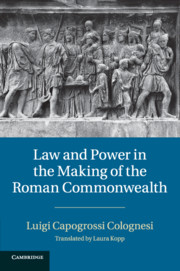Part IV: Universal empire
Abbott, F. F. and Johnson, A. C. (1926) Municipal Administration in the Roman Empire. New York.
Bauman, R. A. (1989) Lawyers and Politics in the Early Roman Empire: A Study of Relations between the Roman Jurists and the Emperors from Augustus to Hadrian. Munich.
Brunt, P. A. (1990) Roman Imperial Themes. Oxford.
Brunt, P. A. and Moore, J. M. (1967) Res Gestae divi Augusti: The Achievements of the Divine Augustus. London.
Corcoran, S. (2000) The Empire of the Tetrarchs: Imperial Pronouncements and Government: ad 284–324. Oxford.
Crook, J. A. (1955) Consilium Principis: Imperial Councils and Counsellors from Augustus to Diocletian. Cambridge.
Eck, W. (1979) Die staatliche Organisation Italiens in der hohen Kaiserzeit. Munich.
Eck, W. (2007) The Age of Augustus2. Oxford.
Galinsky, K., ed. (2005) The Cambridge Companion to the Age of Augustus. Cambridge.
Garnsey, P. (1970) Social Status and Legal Privilege in the Roman Empire. Oxford.
Garnsey, P. and Saller, R. (1987) The Roman Empire: Economy, Society and Culture. London.
Grant, M. (1994) The Antonines: The Roman Empire in Transition. London.
Hammond, M. (1959) The Antonine Monarchy. Rome.
Honoré, T. (1994) Emperors and Lawyers2. Oxford.
Jacques, F. and Scheid, J., eds. (2002) Rome et l’intégration de l’Empire (44 av. J.-C.–260 ap. J.-C.)2, vols. i–ii. Paris.
Jones, A. H. M. (1986) The Later Roman Empire, 284–602, vol. i. Baltimore.
Keresztes, P. (1971) The Constitutio Antoniniana and the Persecutions under Caracalla. New York.
Levick, B. (1990) Claudius. New Haven.
Levick, B. (1991) Vespasian. London.
Lewis, N. and Reinhold, M., eds. (1990) Roman Civilisation: Select Readings, with intro.and notes, vol. ii:The Empire3. New York.
Lo Cascio, E. (2000) Il princeps e il suo impero: studi di storia amministrativa e finanziaria romana. Bari.
Millar, F. (1992) The Emperor in the Roman World. 31 bc–ad 3372. London.
Noreña, C. F. (2011) Imperial Ideals in the Roman West: Representation, Circulation, Power. Cambridge.
Nutton, V. (1978) “The beneficial ideology,” in P. Garnsey and C. R. Whittaker, eds., Imperialism in the Ancient World. Cambridge: 209–21.
Potter, D. S., ed. (2006) A Companion to the Roman Empire. Oxford.
Price, S. R. F. (1984) Rituals and Power: The Roman Imperial Cult in Asia Minor. Cambridge.
Raaflaub, K. and Toher, M. (1990) Between Republic and Empire: Interpretations of Augustus and his Principate. Berkeley.
Richardson, J. S. (2012) Augustan Rome, 44 bc to ad 14: The Restoration of the Republic and the Establishment of the Empire. Edinburgh.
Rutledge, S. H. (2001) Imperial Inquisitions: Prosecutors and Informants from Tiberius to Domitian. London.
Saller, R. P. (1982) Personal Patronage under the Early Empire. Cambridge.
Saller, R. P. (1994) Patriarchy, Property and Death in the Roman Family. Cambridge.
Scheidel, W. (1996) Measuring Sex, Age and Death in the Roman Empire: Explorations in Ancient Demography. Ann Arbor.
Seager, R. (2005) Tiberius the Politician2. Oxford.
Syme, R. (1986) The Augustan Aristocracy. Oxford.
Talbert, R. J. A. (1984) The Senate of Imperial Rome. Princeton.
Taliaferro Boatwright, M. (2000) Hadrian and the Cities of the Roman Empire. Princeton.
Wallace-Hadrill, A. (2008) Rome’s Cultural Revolution. Cambridge.
Wallace-Hadrill, A., ed. (1989) Patronage in Roman Society. London.
Winterling, A. (2009) Politics and Society in Imperial Rome. Malden, MA.
Woolf, G. (2012) Rome: An Empire’s Story. Oxford.
Zanker, P. (1988) The Power of Images in the Age of Augustus. Ann Arbor.



